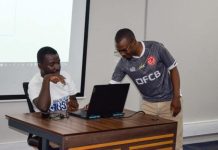By Ephraim Nyondo
Africa-Press – Malawi. The debate between Eisenhower Mkaka and Alfred Gangata over President Arthur Peter Mutharika’s proposed US$500 million Letter of Credit (LC) to resolve Malawi’s persistent fuel crisis is not merely a disagreement about finance — it’s a battle between technical orthodoxy and strategic pragmatism. Both men approach the subject from different vantage points: Mkaka as a banking professional grounded in the rules of financial discipline, and Gangata as a business-minded policymaker driven by economic innovation and confidence-building.
Their exchange encapsulates a deeper question about Malawi’s economic direction: should recovery rely strictly on available cash reserves, or can trust, credibility, and structured financing pave the way forward?
Where Mkaka and Gangata Agree
Despite their heated contrast, the two opinions share some notable common ground:
Understanding the Nature of LCs: Both writers correctly describe a Letter of Credit as a financial guarantee provided by a bank to pay a foreign supplier once the agreed conditions are met. They recognize that an LC is a trade facilitation instrument central to international commerce and that it ultimately requires foreign exchange (forex) to honor the payments.
Recognition of the Forex Problem: Both Mkaka and Gangata agree that Malawi’s forex shortage lies at the heart of the fuel crisis. They understand that the LC proposal cannot work in isolation without addressing this broader liquidity challenge.
Concern for Economic Stability: Both share a patriotic concern for restoring economic stability and ensuring consistent fuel supply, acknowledging that fuel shortages cripple productivity, transport, and the cost of living.
Where Mkaka and Gangata Disagree
The real divide between the two lies not in the definition of a Letter of Credit, but in its feasibility and strategic logic under Malawi’s current economic conditions.
1. The Basis of Confidence: Cash vs. Credibility
Mkaka’s View: Mkaka argues from a banker’s technical standpoint — that no reputable bank would issue a US$500 million LC without knowing where the forex will come from when invoices mature. For him, the process is grounded in existing liquidity, not potential credibility. He believes APM’s idea ignores financial reality and risks creating false hope.
Gangata’s View: Gangata counters that LCs are not necessarily dependent on immediate forex but on structured trade finance and trust in a country’s repayment capacity. He emphasizes creditworthiness, collateral, and sovereign guarantees as sufficient instruments for securing such facilities. His argument hinges on restoring global trust and leveraging Malawi’s financial reputation, not its current reserves.
This reveals a philosophical difference: Mkaka views finance through present liquidity, while Gangata sees it through future credibility.
2. Approach to Economic Recovery
Mkaka suggests that before speaking of LCs, Malawi must first solve the forex crisis — otherwise, the plan is futile. His logic is sequential: first forex, then LCs.
Gangata, on the other hand, sees the LC as a bridge solution — a way to secure fuel and stabilize the economy while structural reforms to boost forex earnings take effect. His sequence is reversed: use LCs now to unlock stability, then rebuild reserves.
This difference captures the technocrat vs. strategist divide: Mkaka insists on caution and compliance, while Gangata advocates pragmatism and bold financial engineering.
3. Trust in the Banking System
Mkaka’s tone reveals skepticism toward the international financial community’s willingness to extend Malawi such a facility, especially given depleted reserves. Gangata’s response is optimistic and assertive, arguing that under Mutharika, re-engagement with donors and global banks will restore that trust, making the LC achievable. To him, the issue is not whether banks will trust Malawi, but whether Malawi can prove itself trustworthy again.
4. Tone and Political Undertones
While Mkaka’s tone is technical, reflective, and slightly incredulous, Gangata’s is political, confident, and combative. Mkaka writes as a former banker diagnosing a policy weakness; Gangata writes as a sitting minister defending his president’s vision and turning the critique into a lesson in economic leadership.
Gangata even throws a political jab at Mkaka’s party, the MCP, accusing it of five years of economic mismanagement — turning what began as a technical discussion into a broader political statement of competence.
Conclusion: A Lesson in Economic Vision and Financial Realism
At the heart of this intellectual duel lies a vital truth: Malawi’s path to economic recovery requires both Mkaka’s caution and Gangata’s courage.
Mkaka reminds us that financial discipline and real forex availability remain the bedrock of sustainable trade; Gangata reminds us that innovation, confidence, and strategic credit mechanisms can unlock growth even amid scarcity.
If Mkaka represents the rules of banking, Gangata represents the art of statecraft — and in a struggling economy, success often depends on balancing the two.
Ultimately, whether APM’s US$500 million LC plan succeeds will depend not only on technical correctness, but also on political credibility, institutional trust, and Malawi’s ability to convince the world that it can pay what it promises.
In short: Mkaka cautions; Gangata dares. And in the tension between caution and courage lies the real story of Malawi’s economic future.
Source: Malawi Nyasa Times
For More News And Analysis About Malawi Follow Africa-Press






